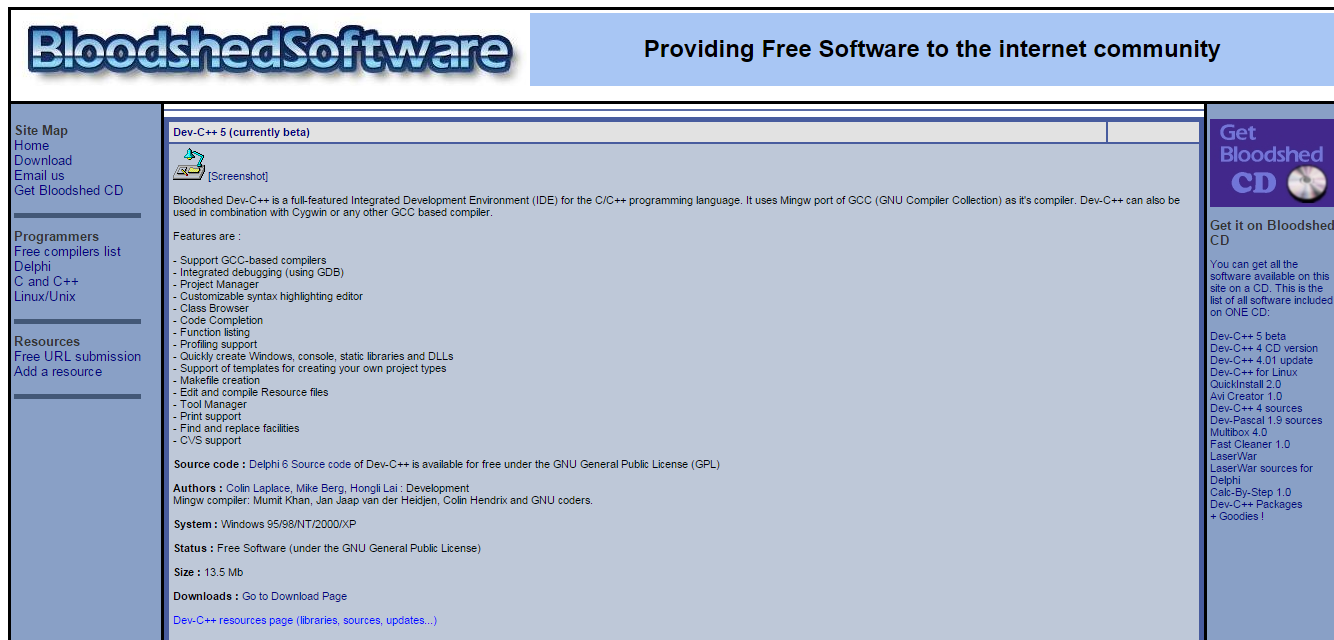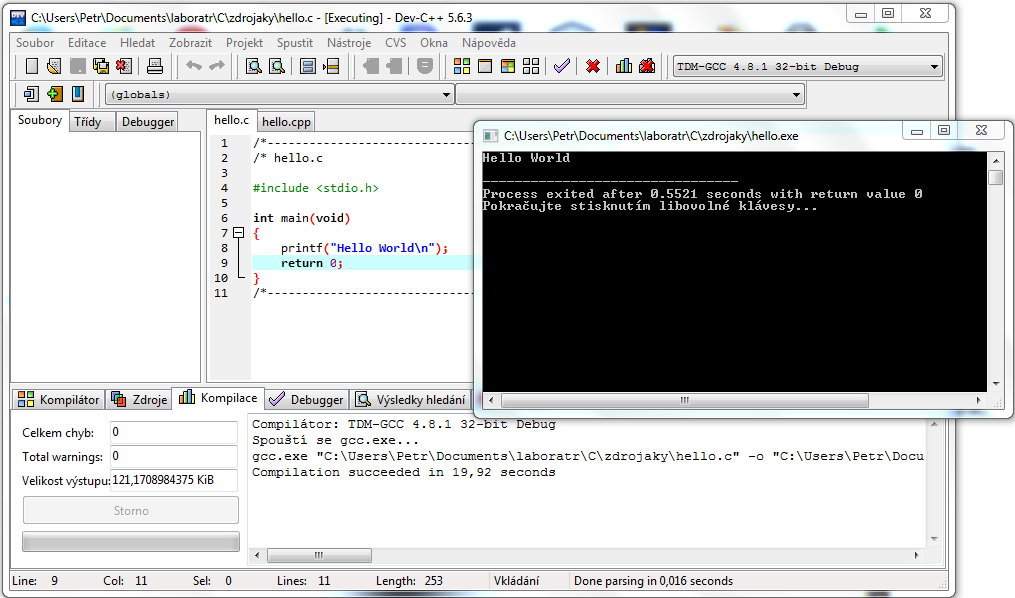After a couple of years working with this fast and portable C/C++ IDE, I've decided to give it an update. That's because the compiler was getting ancient, and it contained a few bugs here and there. It took a while to get the hang of Delphi, but hereby I present to you Dev-C++ 4.9.9.3:
Changes - Version 4.9.9.3 - 24 Juni 2011
Orwell Dev-C is a full-featured Integrated Development Environment (IDE) for the C/C programming language. It uses Mingw port of GCC (GNU Compiler Collection) as its compiler. It creates native Win32 executables, either console or GUI. Orwell Dev-C can also be used in combination with Cygwin. Features: MinGW GCC 4.7.2 32bit TDM-GCC 4.7.1 32/64bit Syntax. Dev c free download - Programming C, Google Chrome dev, Programming in C in 7 days, and many more programs. A new and improved fork of Orwell Dev-C. Contribute to skylee03/My-Dev-Cpp development by creating an account on GitHub.
- Upgraded the Default Compiler to GCC 4.5.2.
- When encountering an error, Dev will now point you to the error line and (new) positions the cursor next to it.
- Added new -march optimization options (core2, k8-sse3, amdfam10). Also added 'native' and 'generic'.
- Cleaned up the explicit -m(some instruction set) options, and added some important ones.
- Cleaned up the TODO viewer.
- Fixed a bug in the GCC output parser: it used to read 1 byte too much afer the 0 of each line, causing crashes.
- Added a column column in the Compiler log.
- Tweaked the default settings. Enable line numbers by default for example.
- Fixed a bug in the Compiler Set creator: it didn't feel like storing command line options for each Compiler.
- Added more UI controls for frequently used GCC flags like -Wall, -Wextra and -pedantic.
- Moved warning related flag options to a new section called 'Code Warnings'.
- Removed the silly optimization controls. Now has a proper None/Low/Med/High combobox.
- Updated the default directory listings to GCC 4.5.2's directories.
- Removed the [Compiler] section from the ini file. Instead of saving the current Compiler Set twice, it saves a Compiler index to refer to.
- By default GCC4 omits required runtime DLL's from executables. I told it to link them by default.
- And some more stuff I forgot about.
Important notices
Orwell Dev-c Review Youtube
- The options format has changed. If you want to reuse an old config file (NOT recommended), or, more importantly, when you're overriding Compiler Options in your project, you need to re-set these project settings once and save the project. You'll then have an updated 4.9.9.3 project file.
- This version has GCC built-in instead of being an aditional package. It also contains D3D9/10/11, GDI, Win32 and OpenGL headers and libraries in that flavor.
Download
The setup can be downloaded here. The source code can be found here.
 Problems
Problems- FIXED: There seems to be a problem with the default relative include paths not being used properly. I seriously need to fix that soon (this weekend probably, after vacation). Together with a few more things to do, I of course also need to post the source code somewhere.

Dev-C++ showing its updated UI and new variable browsing options | |
| Developer(s) | Bloodshed Software until 2005, Orwell (Johan Mes) since 2011 |
|---|---|
| Stable release | |
| Repository | |
| Written in | Delphi |
| Operating system | Microsoft Windows, Linux (alpha only) |
| Type | Integrated development environment |
| License | GNU General Public License |
| Website | orwelldevcpp.blogspot.com www.bloodshed.net at the Wayback Machine (archived March 20, 2016) |
| Usage | |
Dev-C++ is a free full-featured integrated development environment (IDE) distributed under the GNU General Public License for programming in C and C++. It is written in Delphi.
It is bundled with, and uses, the MinGW or TDM-GCC 64bit port of the GCC as its compiler. Dev-C++ can also be used in combination with Cygwin or any other GCC-based compiler.[1]
Dev-C++ is generally considered a Windows-only program, but there are attempts to create a Linux version: header files and path delimiters are switchable between platforms.
Devpaks[edit]
An additional aspect of Dev-C++ is its use of DevPaks: packaged extensions on the programming environment with additional libraries, templates, and utilities. DevPaks often contain, but are not limited to, GUI utilities, including popular toolkits such as GTK+, wxWidgets, and FLTK. Other DevPaks include libraries for more advanced function use. Users of Dev-C++ can download additional libraries, or packages of code that increase the scope and functionality of Dev-C++, such as graphics, compression, animation, sound support and many more. Users can create Devpaks and host them for free on the site. Also, they are not limited to use with Dev-C++ - the site says 'A typical devpak will work with any MinGW distribution (with any IDE for MinGW)'.
Development status[edit]
From February 22, 2005 to June 2011 the project was not noticeably active, with no news posted nor any updated versions released. In a 2006 forum post, lead developer Colin Laplace stated that he was busy with real-life issues and did not have time to continue development of Dev-C++.[2]
There are two forks of Dev-C++ since then: wxDev-C++ and the Orwell version.
wxDev-C++ is a development team that has taken Dev-C++ and added new features such as support for multiple compilers and a RAD designer for wxWidgets applications.
On June 30, 2011 an unofficial version 4.9.9.3 of Dev-C++ was released by Orwell (Johan Mes), an independent programmer,[3] featuring the more recent GCC 4.5.2 compiler, Windows' SDK resources (Win32 and D3D), numerous bugfixes, and improved stability. On August 27, after five years of officially being in a beta stage, version 5.0 was released.[4] This version also has its own separate SourceForge[5] page since version 5.0.0.5, because the old developer isn't responding to combining requests. On July 2014, Orwell Dev-C++ 5.7.1 was released featuring the more recent GCC 4.8.1 which supports C++11.
Notable uses[edit]
Orwell Dev-c Review Guide
On May 4, 2015, The Singapore Prime Minister Lee Hsien Loong posted his Sudoku solver program in C++ on Facebook. In his screen shot, he's using Microsoft Windows and Dev-C++ as his IDE.[6]
See also[edit]
References[edit]
- ^'Bloodshed Software - Providing Free Software to the internet community'. bloodshed.net. Retrieved 8 September 2015.
- ^'Dev-C++'. sourceforge.net. Retrieved 8 September 2015.
- ^Orwell. 'Dev-C++ Blog'. orwelldevcpp.blogspot.com. Retrieved 8 September 2015.
- ^Orwell. 'Dev-C++ Blog'. orwelldevcpp.blogspot.com. Retrieved 8 September 2015.
- ^orwelldevcpp. 'Dev-C++'. SourceForge. Retrieved 8 September 2015.
- ^'Prime Minister of Singapore shares his C++ code for Sudoku solver'. Ars Technica. Retrieved 8 September 2015.
External links[edit]

- Official website
- Dev-C++ on SourceForge.net
- Dev-C++ Portable on SourceForge.net